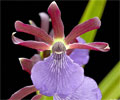|
|
|
|
|
| |
Flasks of
Zygopetalum triste 'Deni' × self |
|
| |
|
|
| |
|
|
Click to Enlarge

Pod Parent Flower |
Click to Enlarge

Pod Parent Closeup of Labellum |
Click to Enlarge

Pod Parent Blooming Plant |
Click to Enlarge

Offspring 'MC5665' Flower |
| Offspring photos are siblings of the plants you would receive. |
|
|
|
| |
Culture Notes from Donor: Parent plant: Temperature range Intermediate 83-60°F
Comments: Parent plant: This small plant is not more than about 9" total height. When the flowers first open they smell like freshly ground pepper and then when they get a bit more mature there is a strong spicy floral perfume that rides on top of the pepper. Many cultivars have pinkish veined lips instead of the intense blue/purple lip of this cultivar.
For additional origin/habitat information supplied courtesy of
Charles and Margaret Baker, see further below, near the bottom of this page.
|
Temperatures we attempt to use in the lab & greenhouse:
| For Species: |
|
Spring, Summer, Autumn: days average 73°F, nights 61°F; best fit is Cool-Intermediate 75-58°F
(Source:
Baker's Web OSC) |
| For Species: |
|
Winter: days average 67°F, nights 51°F; best fit is Cool 70-52°F
(Source:
Baker's Web OSC) |
|
About the name...
| Etymology of |
triste |
|
From Latin "tristis" dark, gloomy, dark purple.
(Source:
Mayr & Schmucker 1998) |
| Etymology of |
Zygopetalum |
|
From latinized Greek "zygos" yoke; "petalum" petals. Petals and sepals are fused with the column foot.
(Source:
Mayr & Schmucker 1998) |
| Pronunciation of |
triste |
|
TRIS-tee
(Source:
Hawkes 1978) |
| Pronunciation of |
Zygopetalum |
|
zy-go-PET-a-lum
(Source:
Hawkes 1978) |
|
If you would like to direct someone to this web page, please copy and paste this URL into your email:
http://troymeyers.com/d?012045
| Flask Information |
| Availability: |
We have sold all of the flasks for this item. |
| You should: |
Consider getting individual plants or compots instead of a flask.
See if we have plants available in the greenhouse. |
| Yield Estimate: |
1050 plants (based on flask surveys done 09/26/2001 through 10/01/2001)
|
| Plantlet Sizes: |
From many flasks 7 - 60 mm plants (based on flask surveys done 09/26/2001 through 03/11/2002)
From one most recently surveyed flask 30 - 45 mm (03/11/2002)
|
|
You might also want to:
|
View the seed assay for this item.
See if we have plants available in the greenhouse.
View items of the same species.
View items of the same genus.
|
| Ordering Information |
| You are not currently logged in. |
|
You must be a registered user and be logged in to reserve a flask or place a notification request. Please log in:
|
|
|
|
|
|
| |
The origin/habitat information below is supplied courtesy of Charles and Margaret Baker
The following information is based on the name of the plant provided by the donor, and assumes that the name is correct. If the plant has been misidentified, then the following information may not be correct.
This text is copyrighted by the Bakers and may not be reproduced without permission.
ORIGIN/HABITAT: Brazil. This orchid is found in southwestern Minas Gerais
south of the old town of Caldas. It is found near the summit of the Serra
da Pedra Branca (Mountains of White Stone) in an area where the granite
rocks are covered with white lichens. Plants grow in water seepages in
cracks between the large, flat expanses of rocks at about 5400 ft. (1650
m) with their roots buried in the lithophytic mosses. These rocks also
serve to collect moisture from dew and nighttime mist which frequently
occur even in the dry season. This condensed moisture then drains into the
water seepages and is available to the plants growing there, so they do
not experience a long or severe dry season.
More about this information and the Bakers...
|
|
|
| |
|
|
|